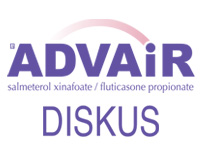
Advair Diskus
Drug Name: Advair Diskus
Active Ingredient: Fluticasone & Salmeterol

Dosage:
Form: Inhalation
Type: Generic
Prescription Required: ![]()
Availability: In Stock
Advair Diskus is primarily used as a maintenance therapy to control symptoms and prevent asthma attacks or COPD exacerbations. It is not a rescue inhaler and should not be used for immediate relief during an acute asthma or COPD attack.
The medication is delivered through a device called the Diskus, which is a breath-activated inhaler. The Diskus contains foil blister packs with the powdered medication. When the Diskus is opened and a dose is taken, the patient inhales the powder through the mouthpiece.
How to use
To use Advair Diskus, follow these general instructions:
- Hold the Diskus in a horizontal position with the mouthpiece facing towards you. Slide the lever away from you until it clicks to open the Diskus.
- Breathe out fully, away from the Diskus, to empty your lungs.
- Place the mouthpiece between your lips and close your lips tightly around it. Do not block the air vents with your fingers or tongue.
- Inhale rapidly and deeply through your mouth, while simultaneously pressing down firmly on the lever until you hear a click. This releases the medication.
- Continue to breathe in slowly and deeply, even after you have finished pressing the lever. This helps ensure that the medication reaches deep into your lungs.
- Hold your breath for about 10 seconds or as long as is comfortable, then remove the Diskus from your mouth.
- Breathe out slowly and gently away from the Diskus.
- Close the Diskus by sliding the lever back towards you until it clicks. This protects the remaining medication and keeps the Diskus ready for your next use.
Dosage
The dosage of Advair Diskus can vary depending on the individual's condition, age, and the severity of their symptoms. The medication is available in different strengths, which are measured in micrograms (mcg) of fluticasone propionate and salmeterol. The typical recommended dosages for adults and adolescents (12 years and older) are as follows:
Asthma:
- For patients not adequately controlled on an inhaled corticosteroid: The usual dosage is 100 mcg/50 mcg or 250 mcg/50 mcg (fluticasone propionate/salmeterol) twice daily.
Chronic Obstructive Pulmonary Disease (COPD):
- The usual dosage is 250 mcg/50 mcg twice daily.
Side effects
Advair Diskus may cause certain side effects. While not everyone experiences these side effects, it's important to be aware of them. Common side effects include:
- Throat irritation: You may experience irritation, dryness, or a hoarse voice. Rinsing your mouth with water after each use can help minimize this side effect.
- Headache: Some individuals may experience mild to moderate headaches while using Advair Diskus. Drinking plenty of water and rest can often help alleviate this symptom.
- Fungal infections: There is a risk of developing a yeast infection in the mouth or throat (oral candidiasis). It is important to rinse your mouth with water and spit it out after using Advair Diskus to reduce the chances of developing a fungal infection. If you notice white patches in your mouth or experience persistent sore throat or difficulty swallowing, seek medical attention.
- Bronchospasm: In rare cases, Advair Diskus may paradoxically cause breathing difficulties, chest tightness, or wheezing. If you experience these symptoms, seek immediate medical attention.
- Systemic effects: As with any inhaled corticosteroid, Advair Diskus may have potential systemic effects, such as adrenal suppression, reduced bone mineral density, and an increased risk of cataracts or glaucoma. These effects are more likely to occur with long-term use at high doses.
Storage
When it comes to storing Advair Diskus, it's important to follow the recommended guidelines to maintain the medication's effectiveness and ensure its safety. Here are the storage instructions:
- Keep inhalerы in its original packaging until you are ready to use it. The packaging is designed to protect the medication from light, moisture, and other environmental factors.
- Store Advair Diskus at room temperature, typically between 68°F (20°C) and 77°F (25°C).
- Avoid exposing pharmaceutical product to extreme temperatures, such as freezing or excessive heat. Do not store it in the refrigerator.
- Keep the Diskus dry. Store it in a dry place away from moisture and humidity, such as a bathroom cabinet or the kitchen sink.
- Keep inhalerы out of the reach of children and pets.
- Do not use Advair Diskus after the expiration date printed on the packaging. Expired medication may not be as effective and could potentially be harmful.
Overdose
An overdose of Advair Diskus can be potentially harmful and should be avoided. If you suspect an overdose or have accidentally taken more than the prescribed dosage, it is important to seek immediate medical attention.
Symptoms of an Advair Diskus overdose may include:
- Shakiness or tremors
- Increased heart rate or palpitations
- Chest pain
- Nervousness or anxiety
- Headache
- Muscle cramps
- Flushing or redness of the face
In case of an accidental overdose, contact your local poison control center or go to the nearest emergency room for immediate medical assistance.
Missed Doses
If you miss a dose of Advair Diskus, take it as soon as you remember. However, if it is almost time for your next scheduled dose, skip the missed dose and continue with your regular dosing schedule. Do not double the dose to make up for the missed one.
It's important to maintain a consistent dosing schedule with Advair Diskus to effectively manage your symptoms. Missing doses can reduce the medication's effectiveness in controlling your asthma or COPD symptoms and may increase the risk of exacerbations.




